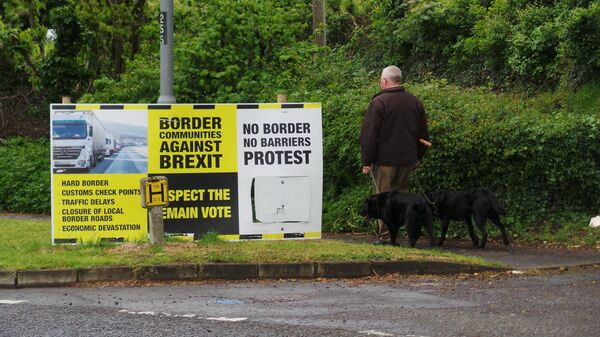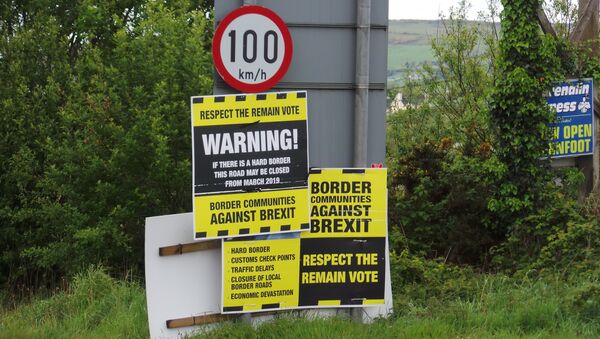Northern Ireland is the only part of the UK which will share a land border with a European Union member state from March 2019. On Tuesday the government's Department for Exiting the European Union unveiled a position paper which suggested a "temporary customs union" with the EU after Brexit.
Today we have unveiled a new paper setting out proposals for our future customs relationship with the EU https://t.co/IY1JyN6wVP pic.twitter.com/emKYJLr8Ht
— Exiting the EU Dept (@DExEUgov) August 15, 2017
Now the Brexit Ministry has suggested a "new customs partnership" with the Republic of Ireland and a "highly streamlined customs arrangement." The position paper, which has been published on the Brexit Ministry's website, forms part of the government's Brexit negotiation strategy. It says the government does not want to see any physical infrastructure — border posts — at the Irish frontier.
We've published our position paper on the unique circumstances of Northern Ireland and the land border with Ireland https://t.co/Ycb4nXIwXn pic.twitter.com/hvf25ujDG2
— Exiting the EU Dept (@DExEUgov) August 16, 2017
The document says the UK welcomes the clear commitment from the European Council and Commission to work on "flexible and imaginative" solutions to avoid a hard border.
"The UK government's clear priority in devising new border arrangements is to respect the strong desire from all parties and all parts of the community in Northern Ireland and Ireland to avoid any return to a hard border, and to maintain as seamless and frictionless a border as possible," it adds.
On Tuesday, Brexit Secretary David Davis said there were "unique circumstances" involving the border of Northern Ireland and the Republic of Ireland.
The border has been in existence since 1923 when Ireland was divided into the Irish Free State and Northern Ireland, which remained part of the United Kingdom because of the wishes of the Protestant, unionist or loyalist majority. Border checks were in existence between 1923 and 1993, when they were abolished as part of the creation of the EU's single market.

In the 1970s the Provisional IRA would often base themselves in one of the four counties on the southern side of the border — Donegal, Cavan, Monaghan or Louth — and mount terrorist operations in Northern Ireland before slipping back over the frontier. This went on until the Good Friday Agreement was signed in 1998.
But since then, diesel and other products are sometimes smuggled across the border — often using underground pipelines — because of price differentials between the two countries.
Around £13.6 billion (US$17.5 billion) worth of goods are expected to the Republic from the UK last year and £9.1 billion (US$11.7 billion) went the other way, although much of it went by sea and air, rather than by land.
Both the UK and Irish governments have repeatedly stated their opposition to a hard border. There have also been fears the reintroduction of a "hard border" would severely damage the Northern Ireland peace process and have a harmful economic impact, especially on Ulster.
Reactions
The Democratic Unionist Party (DUP), who agreed to prop up Theresa May's Conservative Party in government after the general election in June, were adamant there should be no hard border as part of Brexit.
DUP leader Arlene Foster applauded the government's position on Wednesday.
"I welcome the commitment to a seamless border and movement of goods between Ireland and Northern Ireland. It is also welcome news that the Government will not countenance any new border in the Irish Sea," she said.
Welcome for publication of Government position paper | Democratic Unionist Party: https://t.co/vzjpS5fr1L
— DUP (@duponline) August 16, 2017
"The DUP will not be deflected by those who want to refight old battles. As set out in our 2017 Westminster Manifesto, we will focus on getting the best deal for Northern Ireland as we exit the EU," said Mrs. Foster.
In the position paper published on Wednesday, the UK government point out the Good Friday Agreement "represents the bedrock of the peace process" and one of the key strands includes "arrangements for cross-border and all-island cooperation."
But Northern Ireland-born Labour MP Conor McGinn said the British government were guilty of "vagueness and posturing."
"These proposals on a light touch border are lighter still on detail," he said.
— Conor McGinn MP (@ConorMcGinn) August 16, 2017
Govt says no border checks on island of Ireland between EU/UK & no border between NI/GB. So how & where do immigration checks take place?
— Conor McGinn MP (@ConorMcGinn) August 16, 2017
The Liberal Democrats criticized the government's paper, calling Westminster leadership "shambolic".
"Just when you thought the government couldn't get any more shambolic, now a major position paper is being announced by an anonymous source," a statement on the party's website reads.
The Government has used an anonymous source to announce its official Northern Ireland position paper. That's weird. https://t.co/JF0DUtxZIs
— Liberal Democrats (@LibDems) August 16, 2017
In July, the new Irish Taoiseach Leo Varadkar said the country will not design a border for Brexiteers.
"As far as this Government is concerned there shouldn’t be an economic border. We don’t want one."


